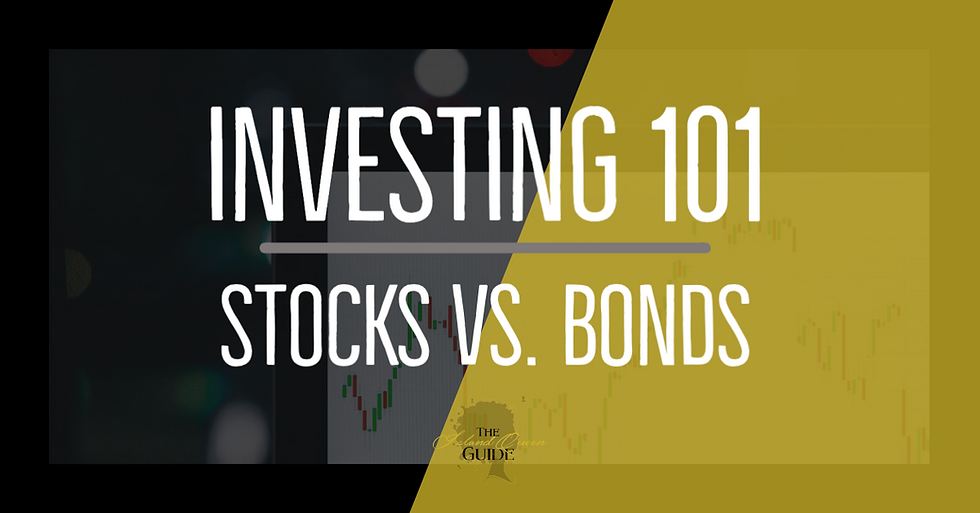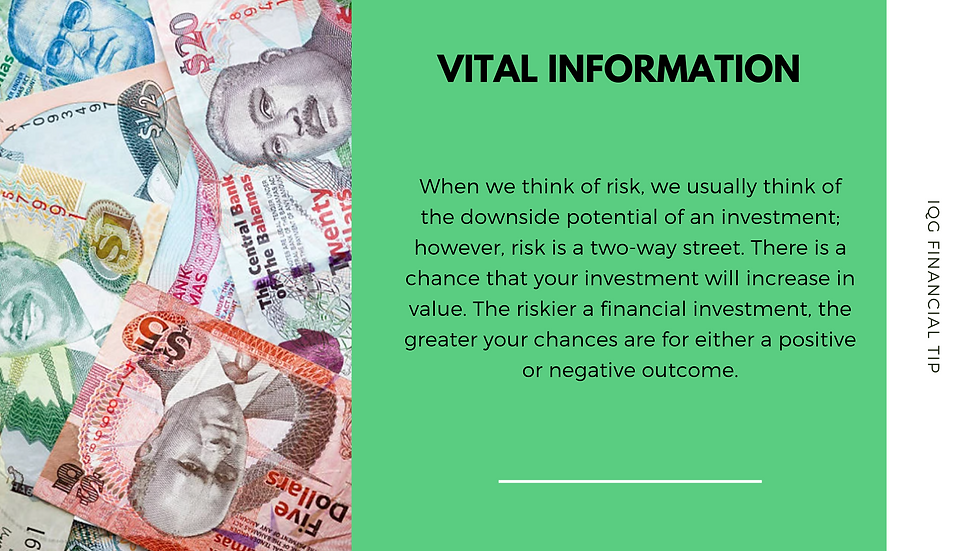Investing 101: Stocks vs. Bonds
- Tammi
- Jun 8, 2020
- 4 min read

There are many people who want to start investing money, but financial terminology can be confusing. Here at IQG, we would like to make it easier to digest by rolling out a series of terminology explanations for you. Understanding the terminology is a good first step when considering how best to save and invest your money, diversify your assets, and achieve specific financial goals. In this article, we will explore the fundamental differences between stocks and bonds.
Definitions
To begin, let us look at the term definitions that illustrate the main difference between them.
A stock is an equity instrument, which simply means that it is evidence of ownership rights in a company. If a company issues stock (also referred to as ‘shares’), it is essentially selling a portion of its ownership. For example, after three years of successful operations, ABC Bahamas Company wants to expand its business but is unable to do it because of a lack of financial resources. The company decides that it wants to raise funds through what is known as an initial public offering or IPO that entails selling a portion of its company to the public. If you decide to purchase ABC Bahamas Company’s stock, you would be considered a partial owner (shareholder) in the company, even if your purchase is very small.
On the other hand, bonds are debt instruments, which simply means that if you purchase bonds, the issuing entity owes you money. Both companies and governments use bonds to raise money. For example, the Bahamian government periodically issues Bahamas Registered Stock (BRS), which is the equivalent of government bonds. Persons who purchase BRS are essentially lending money to the government and are repaid interest and their principle (initial) amount. To learn more about BRS, check out our article on Government Bonds here.
Financial Returns and Benefits
Both stocks and bonds have financial advantages that can benefit an investor’s portfolio. It is important to consider both the upside and downside potential of your investments.
Stock returns are in the form of dividends, which are a portion of the company’s financial earnings that are distributed to shareholders. For example, ABC Bahamas Company made earnings of $1 million two years after the IPO and decides to pay a $5 dividend to shareholders. If you purchased three shares, you would receive $15. Dividends, in most cases, are not mandatory pay-outs and are not the same as interest payments.
Shareholders can also benefit from price appreciation of their shares. For example, if share price increases from $3 to $10, your overall investment of purchasing three shares would increase from $9 to $30. If you decide to sell at the price of $30, your overall profit would be $21. Remember that investing is a two-way street and prices can also decrease and that can negatively affect your investment.
Conversely, bond returns are in the form of interest payments, usually paid twice per year. For example, if the government promises a 5% annual return on bonds and you purchased $1,000 worth of bonds, you will receive $50 per year in interest payments. Interest payments on bonds are usually mandatory, which means your return would most likely be guaranteed. This does not necessarily make bonds safer investments than stocks.

Risk Elements to Consider
There are many risk elements to consider when deciding which stocks and bonds to add to your investment portfolio, here are a few:
Volatility – Bonds tend to be less volatile than stocks (this does not necessarily mean that they are safer investments). Volatility is measured by the rate at which prices move up and down; and stock prices tend to move more frequently than bond prices, which is an indicator of investment risk.
Time Horizon – This is the total length of time an investor expects to hold an investment instrument. Bonds have a maturity date, for example a bond may have a maturity date 10 years from now. At the maturity date, you will receive the initial amount you invested. Stocks do not have a specific maturity date. For example, if you bought shares in ABC Bahamas Company, you can hold them indefinitely. Time horizon is important to consider because it helps you to gauge financial goals. For example, if you are saving for a home in five years, you may want to choose investments with short time horizons that can be easily liquidated in time for your purchase.
Investment Return Guarantee – With any investment, there is the risk that you may lose some or all of the money you invested; both stocks and bonds have this risk. Take the time to research potential investments and weigh the pros and cons for your financial portfolio. Research may entail a simple Google search, reading through company information, or a conversation with a financial advisor.

Final Thoughts
Deciding what to invest in is a personal decision based on your specific goals. There is no right or wrong answer when choosing between stocks and bonds. Having both in your investment portfolio may prove beneficial for diversification purposes and the pros and cons of both may help with balancing the risk levels. If you are new to investing, take the time to review and research all potential options and do not be afraid to ask for guidance from a financial advisor to weigh your options.
Note: This article does not serve as official investment advice; it is simply an explanation of terms for new investors.




Comments